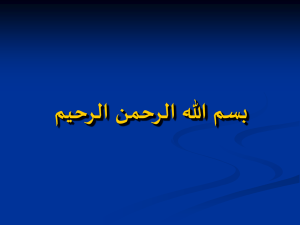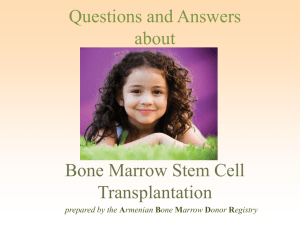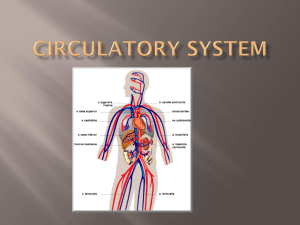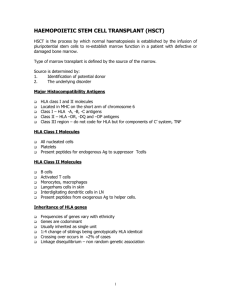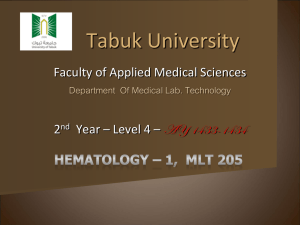Administrative Office St. Joseph`s Hospital Site, L301
advertisement
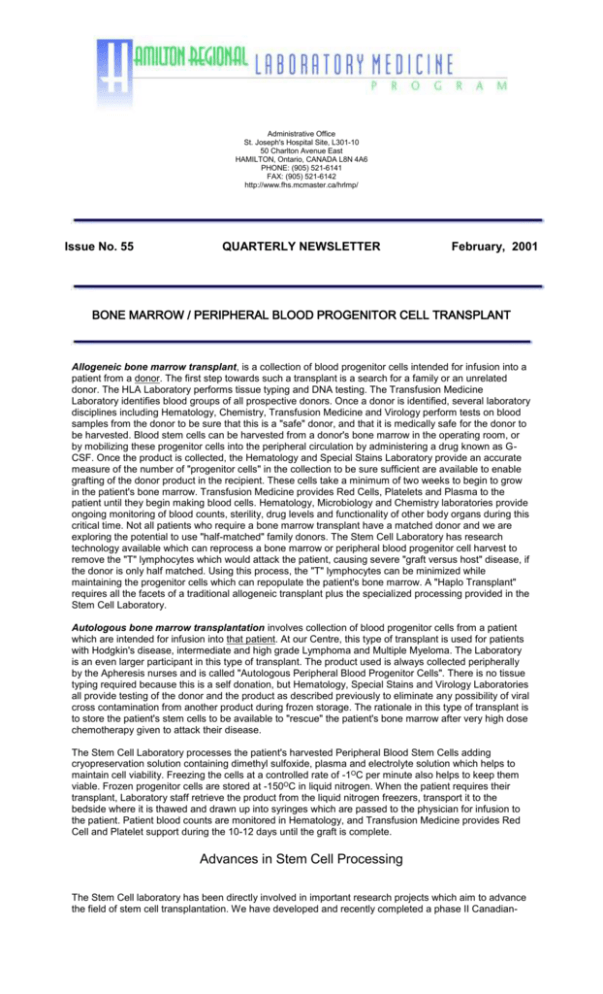
Administrative Office St. Joseph's Hospital Site, L301-10 50 Charlton Avenue East HAMILTON, Ontario, CANADA L8N 4A6 PHONE: (905) 521-6141 FAX: (905) 521-6142 http://www.fhs.mcmaster.ca/hrlmp/ Issue No. 55 QUARTERLY NEWSLETTER February, 2001 BONE MARROW / PERIPHERAL BLOOD PROGENITOR CELL TRANSPLANT Allogeneic bone marrow transplant, is a collection of blood progenitor cells intended for infusion into a patient from a donor. The first step towards such a transplant is a search for a family or an unrelated donor. The HLA Laboratory performs tissue typing and DNA testing. The Transfusion Medicine Laboratory identifies blood groups of all prospective donors. Once a donor is identified, several laboratory disciplines including Hematology, Chemistry, Transfusion Medicine and Virology perform tests on blood samples from the donor to be sure that this is a "safe" donor, and that it is medically safe for the donor to be harvested. Blood stem cells can be harvested from a donor's bone marrow in the operating room, or by mobilizing these progenitor cells into the peripheral circulation by administering a drug known as GCSF. Once the product is collected, the Hematology and Special Stains Laboratory provide an accurate measure of the number of "progenitor cells" in the collection to be sure sufficient are available to enable grafting of the donor product in the recipient. These cells take a minimum of two weeks to begin to grow in the patient's bone marrow. Transfusion Medicine provides Red Cells, Platelets and Plasma to the patient until they begin making blood cells. Hematology, Microbiology and Chemistry laboratories provide ongoing monitoring of blood counts, sterility, drug levels and functionality of other body organs during this critical time. Not all patients who require a bone marrow transplant have a matched donor and we are exploring the potential to use "half-matched" family donors. The Stem Cell Laboratory has research technology available which can reprocess a bone marrow or peripheral blood progenitor cell harvest to remove the "T" lymphocytes which would attack the patient, causing severe "graft versus host" disease, if the donor is only half matched. Using this process, the "T" lymphocytes can be minimized while maintaining the progenitor cells which can repopulate the patient's bone marrow. A "Haplo Transplant" requires all the facets of a traditional allogeneic transplant plus the specialized processing provided in the Stem Cell Laboratory. Autologous bone marrow transplantation involves collection of blood progenitor cells from a patient which are intended for infusion into that patient. At our Centre, this type of transplant is used for patients with Hodgkin's disease, intermediate and high grade Lymphoma and Multiple Myeloma. The Laboratory is an even larger participant in this type of transplant. The product used is always collected peripherally by the Apheresis nurses and is called "Autologous Peripheral Blood Progenitor Cells". There is no tissue typing required because this is a self donation, but Hematology, Special Stains and Virology Laboratories all provide testing of the donor and the product as described previously to eliminate any possibility of viral cross contamination from another product during frozen storage. The rationale in this type of transplant is to store the patient's stem cells to be available to "rescue" the patient's bone marrow after very high dose chemotherapy given to attack their disease. The Stem Cell Laboratory processes the patient's harvested Peripheral Blood Stem Cells adding cryopreservation solution containing dimethyl sulfoxide, plasma and electrolyte solution which helps to maintain cell viability. Freezing the cells at a controlled rate of -1OC per minute also helps to keep them viable. Frozen progenitor cells are stored at -150OC in liquid nitrogen. When the patient requires their transplant, Laboratory staff retrieve the product from the liquid nitrogen freezers, transport it to the bedside where it is thawed and drawn up into syringes which are passed to the physician for infusion to the patient. Patient blood counts are monitored in Hematology, and Transfusion Medicine provides Red Cell and Platelet support during the 10-12 days until the graft is complete. Advances in Stem Cell Processing The Stem Cell laboratory has been directly involved in important research projects which aim to advance the field of stem cell transplantation. We have developed and recently completed a phase II Canadian- based study evaluating a new growth factor known as stem cell factor (SCF). SCF is a glycoprotein that acts on primitive progenitor cells and can be used in combination with existing growth factors. We have found that the addition of stem cell factor was well tolerated and led to a dramatic increase in the number of stem cells collected following a single collection. The importance of these data directly relates to a proportion of patients who fail to mobilize sufficient stem cells and can not be transplanted. The utilization of SCF in these patients has resulted in the ability to safely transplant patients previously considered ineligible for Bone Marrow Transplantation. A phase I gene therapy study in patients with metastatic melanoma has been recently completed. This work highlights a new type of cell known as a Dendritic Cell (DC). DCs are a heterogeneous population of antigen presenting cells (APCs) identified in various tissues including the skin (Langerhans cells), lymph nodes (interdigitating and follicular DCs), spleen and thymus. Properties of DCs include the ability to: (1) capture, process and present foreign antigens, (2) migrate to lymphoid-rich tissue, and (3) stimulate innate and adaptive antigen-specific immune responses. Until recently the ability to study DCs has been limited by their relative absence in most culture systems. It is now known that specific cytokines can be used to expand DCs to numbers sufficient for in vitro evaluation and use in human immunotherapy trials. Human autologous DCs can be derived from hematopoietic progenitors (CD34+-derived DCs) isolated from mobilized peripheral blood progenitor cells (PBPC), bone marrow and cord blood, or from adherent peripheral blood monocytes (monocyte-derived DCs). Cultured DCs are recognized by a veiled appearance and expression of surface markers, which include MHC class II, CD86/B7.2, CD8O/B7.l, CD83 and CD1a. DCs are susceptible to a variety of gene transfer protocols that may enhance biological function in vivo. Transduction of DCs with defined tumour antigens results in sustained protein expression and presentation of multiple potential tumour peptides to T cells. Alternatively, DCs may be transduced with genes for chemokines or immunostimulatory cytokines, which can enhance or direct APC function towards a specific immunological response (i.e. Th1 vs. Th2). Although the combination of ex vivo DC expansion and gene transfer is new, preliminary studies suggest that injection of genetically modified autologous DCs may be capable of inducing an anti-tumour immune response in patients with cancer. Preclinical animal studies, demonstrating the ability of DC-based vaccines to generate potent antigenspecific tumour immunity, support this hypothesis and provide rationale to evaluate this approach in human patients. These early studies address fundamental issues relating to cell dose, schedule of vaccination, route of delivery and maturational state of cultured DCs. Suggested Reading: 1. 2. 3. 4. 5. 6. 7. Thomas ED: Bone Marrow Transplantation: A Review. Semin Hematol 36(suppl 7):95-103 Hart DNJ: Dendritic cells: Unique leukocyte populations which control the primary immune response. Blood 1997, Nov 1; 90(9) 3245-87. Steinman RM: The dendritic cell system and its role in immunogenicity. Annu Rev Immunol 1991, 9:271. Siena S, Di Nicola M, Bregni M, Mortarini R, Anichini A, Lombardi L, Ravagnani F, Parmiani G, Gianni AM: Massive ex vivo generation of functional dendritic cells from mobilized CD34+ blood progenitors for anticancer therapy. Exp Hematol 1995, 23:1463. Wan Y, Emtage P, Foley R, Carter R, Gauldie J. Murine dendritic cells transduced with an adenoviral vector expressing a defined tumor antigen can overcome anti-adenovirus neutralizing immunity and induce effective tumor regression. Int J of Oncology 1999, 14 Guinan EC, Gribben JG, Boussiotis VA, Freeman GJ, Nadler LM: Pivotal Role of the B7:CD28 Pathway in Transplantation Tolerance and Tumor Immunity. Blood 1994, Nov 15; 84 (No 10); 3261-3282 Graham FL, Prevec L: Methods for construction of adenovirus vectors. Mol Biotechnol 1995, June; 3(3): 207-20. S. Ronan Foley, M.D., FRCPC, Assistant Professor Director, Stem Cell Laboratory Head, Malignant Hematology Diagnostic Service Hamilton Regional Laboratory Medicine Program Hamilton Health Sciences Corporation, Henderson General Hospital Site

